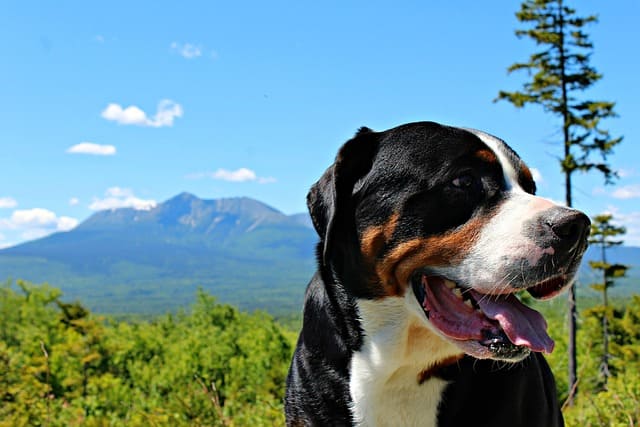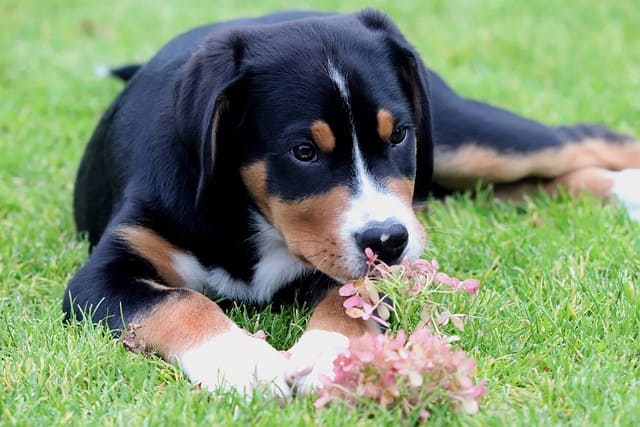The Greater Swiss Mountain Dog, often affectionately called the “Swissy,” is a majestic and robust breed with a rich history and distinctive characteristics. This breed is known for its strength, loyalty, and gentle temperament. In this comprehensive guide, we’ll explore the origins, physical traits, temperament, health considerations, and more to provide a thorough understanding of the Greater Swiss Mountain Dog.
History of the Greater Swiss Mountain Dog

The history of the Greater Swiss Mountain Dog is intertwined with the history of Switzerland, where the breed originated. These dogs have been an integral part of Swiss life for centuries, contributing to various aspects of daily living.
Swiss Working Dogs
Greater Swiss Mountain Dogs are descendants of large working dogs that the Romans brought with them when they invaded Switzerland over two millennia ago. These dogs were subsequently crossed with native Swiss dogs, resulting in the breed we know today.
Versatile Working Dogs
These dogs were valued for their versatility in various roles, such as guarding, herding, and drafting. They were especially known for their use as draft animals, helping Swiss farmers with tasks like pulling carts and herding cattle.
Decline and Revival
By the late 19th century, the breed had declined in numbers due to changes in farming practices and the use of other dog breeds. However, the Greater Swiss Mountain Dog was revived by enthusiasts in the early 20th century.
Swiss National Symbol
The breed is highly regarded in Switzerland and has even been considered a national symbol. They are celebrated for their loyalty and dedication to their human families.
Physical Characteristics
The Greater Swiss Mountain Dog is a powerful and well-muscled breed.
Size
This breed is large, with adult males typically standing between 25.5 to 28.5 inches (65 to 72 cm) at the shoulder and weighing between 140 to 155 pounds (64 to 70 kg). Adult females are slightly smaller, standing between 23.5 to 27 inches (60 to 68.5 cm) and weighing between 110 to 120 pounds (50 to 54 kg).
Coat
Greater Swiss Mountain Dogs have a dense, short double coat. Their coat is striking, with a black base and distinctive rust markings on their cheeks, eyebrows, and legs. A white blaze on the face, chest, and feet is also common.
Ears
Their medium-sized ears are set high on the head and are triangular in shape. They hang down and are in proportion to the size of the dog’s head.
Tail
The breed’s tail is thick at the base and tapers to a point. It’s carried low when the dog is relaxed and may be slightly raised when they are alert or excited.
Head
The Greater Swiss Mountain Dog has a strong and well-proportioned head. Their eyes are dark brown and expressive, with a gentle and intelligent expression. Their muzzle is broad and strong, with a defined stop.
Temperament and Behavior
Greater Swiss Mountain Dogs are known for their friendly and gentle temperament.
Gentle and Affectionate
This breed is often described as gentle and affectionate. They form deep bonds with their families and are known for their loyalty and devotion. They are excellent companions for those who seek a loving and dedicated pet.
Good with Children
Greater Swiss Mountain Dogs are typically good with children. Their patient and gentle nature make them excellent family dogs. They are protective of their young family members and often act as natural caretakers.
Social and Friendly
These dogs are usually social and friendly with people and other animals. While they are not typically aggressive, they can be wary of strangers, making them good watchdogs.
Alert and Watchful
Greater Swiss Mountain Dogs are alert and watchful by nature. They are often aware of their surroundings and will bark to alert their owners to any unusual activity.
Protective Instincts
The breed has a natural protective instinct, and they can be reserved with strangers. This makes them reliable guard dogs, as they will protect their home and family if they sense a threat.
Good Natured
Despite their protective instincts, Greater Swiss Mountain Dogs are good-natured and not aggressive without reason. They are known for their stability and calm demeanor.
Intelligent

This breed is intelligent and typically quick to learn. They respond well to positive reinforcement-based training methods and enjoy mentally stimulating activities.
Adaptability
Greater Swiss Mountain Dogs are adaptable and can adjust to various living environments. While they do best in homes with ample space, they can adapt to apartment living if their exercise and mental stimulation needs are met.
Health Considerations
Greater Swiss Mountain Dogs are generally healthy dogs. However, like all breeds, they are prone to certain health concerns.
Hip Dysplasia
Hip dysplasia is a common orthopedic condition in dogs, and the Greater Swiss Mountain Dog is no exception. It occurs when the hip joint doesn’t develop properly, leading to arthritis and lameness. Responsible breeding practices can help reduce the risk of hip dysplasia.
Elbow Dysplasia
Elbow dysplasia is another orthopedic condition that can affect this breed. It involves an abnormal development of the elbow joint and can lead to lameness and pain. Regular veterinary check-ups can help detect and address elbow dysplasia.
Bloat (Gastric Torsion)
Bloat, also known as gastric torsion, is a life-threatening condition where the stomach fills with gas and twists. This can block blood flow and lead to tissue damage. Greater Swiss Mountain Dogs are one of the breeds at higher risk for bloat, and it’s essential to be aware of the symptoms and seek immediate veterinary attention if you suspect bloat.
Epilepsy
Epilepsy is a neurological condition that can affect dogs, including Greater Swiss Mountain Dogs. It can result in seizures and requires veterinary management.
Osteosarcoma
Osteosarcoma is a type of bone cancer that can affect large breeds, including the Greater Swiss Mountain Dog. It is an aggressive and often life-threatening condition. Early detection and intervention are crucial.
Allergies
Some Greater Swiss Mountain Dogs may be prone to allergies, which can manifest as skin issues and digestive problems. Identifying and managing allergies can help maintain your dog’s health and well-being.
Weight Management
Maintaining a healthy weight is important to prevent strain on the joints and reduce the risk of conditions like hip dysplasia and bloat. Proper portion control and regular exercise are essential.
Grooming Needs
Greater Swiss Mountain Dogs have moderate grooming needs.
Coat Care
Their dense, short double coat requires regular brushing to remove loose hair and maintain coat health. While they do shed, it’s not excessive, making them relatively low-maintenance in terms of grooming.
Bathing
Greater Swiss Mountain Dogs do not require frequent baths. Occasional bathing, such as when they get dirty or develop a doggy odor, is sufficient.
Ear Cleaning
Their ears should be inspected regularly and cleaned as needed to prevent infections. Their floppy ears can trap moisture and debris, making them prone to ear issues.
Nail Trimming
Routine nail trimming is important to keep your Greater Swiss Mountain Dog’s nails at an appropriate length. Overgrown nails can be uncomfortable and lead to mobility issues.
Is a Greater Swiss Mountain Dog Right for You?
Determining whether a Greater Swiss Mountain Dog is the right fit for your family and lifestyle involves careful consideration of your living space, willingness to meet their exercise and grooming needs, and appreciation for their loyal and gentle temperament.
Consider the following:
- Space: Do you have the space to accommodate a large breed dog like the Greater Swiss Mountain Dog? They thrive in homes with ample room to move around.
- Exercise: Can you commit to providing regular exercise and mental stimulation for your dog? They enjoy activities like walks, playtime, and potentially hiking.
- Grooming: Are you prepared for regular grooming, including brushing and occasional ear cleaning? Their moderate grooming needs are manageable but essential.
- Health Awareness: Are you aware of the potential health concerns that can affect this breed and willing to invest in regular veterinary check-ups and preventative care?
- Loyalty and Protectiveness: Are you seeking a loyal and protective companion who will be a devoted member of your family?
- Good with Children: Do you have or plan to have children? Greater Swiss Mountain Dogs are typically good with kids and can be wonderful family pets.
- Adaptability: Can you provide the necessary exercise and mental stimulation, even if you live in an apartment or a smaller living space?
If your lifestyle aligns with the characteristics and needs of the Greater Swiss Mountain Dog, and you appreciate their loyalty and gentle nature, this breed can become a cherished member of your household. With the right care, attention, and a commitment to their well-being, a Greater Swiss Mountain Dog can offer years of companionship and the joy of having a devoted and loving pet by your side.
Conclusion

The Greater Swiss Mountain Dog, with its majestic appearance and gentle temperament, is a breed that captures the hearts of many dog enthusiasts. Their history as Swiss working dogs and their reputation as loyal and protective companions make them a valuable addition to the lives of those who appreciate their qualities.
Before bringing a Greater Swiss Mountain Dog into your life, carefully consider your living space, exercise and grooming capabilities, and willingness to provide for their needs. With the right match, a Greater Swiss Mountain Dog can become a devoted and loving member of your family, offering years of companionship, loyalty, and the joy of having a steadfast and affectionate pet by your side.
